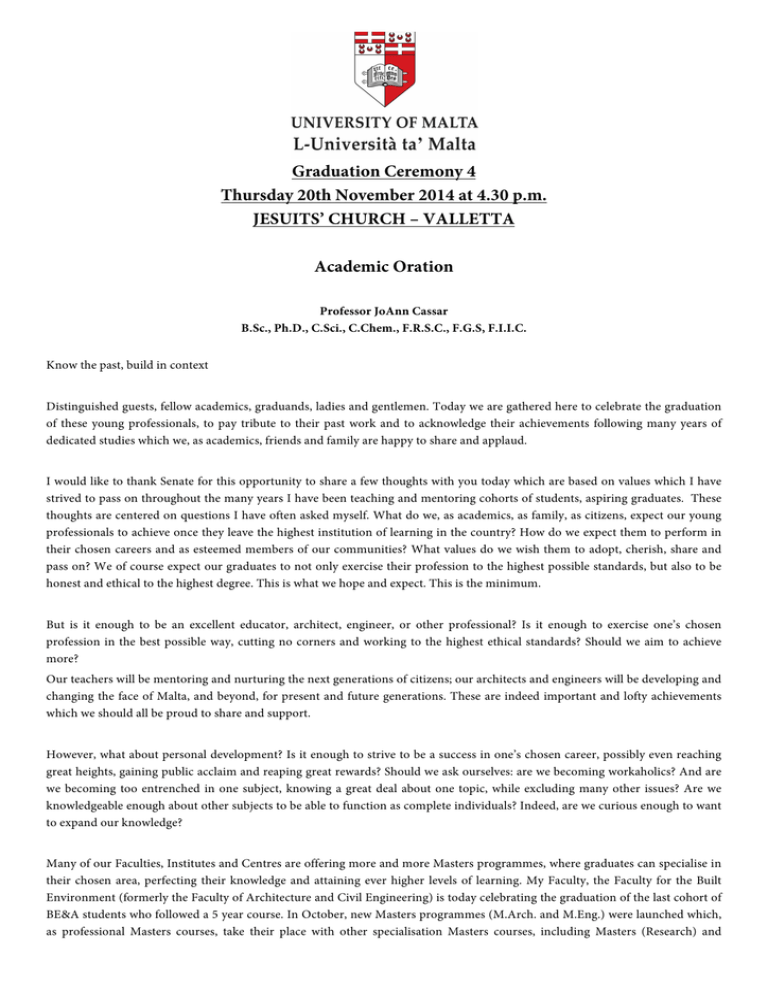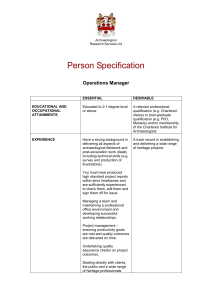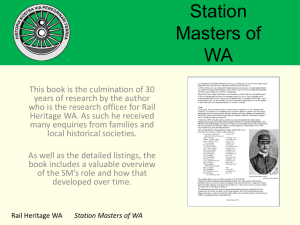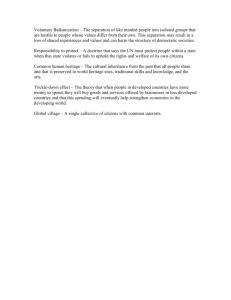Graduation Ceremony 4 Thursday 20th November 2014 at 4.30 p.m.
advertisement

Graduation Ceremony 4 Thursday 20th November 2014 at 4.30 p.m. JESUITS’ CHURCH – VALLETTA Academic Oration Professor JoAnn Cassar B.Sc., Ph.D., C.Sci., C.Chem., F.R.S.C., F.G.S, F.I.I.C. Know the past, build in context Distinguished guests, fellow academics, graduands, ladies and gentlemen. Today we are gathered here to celebrate the graduation of these young professionals, to pay tribute to their past work and to acknowledge their achievements following many years of dedicated studies which we, as academics, friends and family are happy to share and applaud. I would like to thank Senate for this opportunity to share a few thoughts with you today which are based on values which I have strived to pass on throughout the many years I have been teaching and mentoring cohorts of students, aspiring graduates. These thoughts are centered on questions I have often asked myself. What do we, as academics, as family, as citizens, expect our young professionals to achieve once they leave the highest institution of learning in the country? How do we expect them to perform in their chosen careers and as esteemed members of our communities? What values do we wish them to adopt, cherish, share and pass on? We of course expect our graduates to not only exercise their profession to the highest possible standards, but also to be honest and ethical to the highest degree. This is what we hope and expect. This is the minimum. But is it enough to be an excellent educator, architect, engineer, or other professional? Is it enough to exercise one’s chosen profession in the best possible way, cutting no corners and working to the highest ethical standards? Should we aim to achieve more? Our teachers will be mentoring and nurturing the next generations of citizens; our architects and engineers will be developing and changing the face of Malta, and beyond, for present and future generations. These are indeed important and lofty achievements which we should all be proud to share and support. However, what about personal development? Is it enough to strive to be a success in one’s chosen career, possibly even reaching great heights, gaining public acclaim and reaping great rewards? Should we ask ourselves: are we becoming workaholics? And are we becoming too entrenched in one subject, knowing a great deal about one topic, while excluding many other issues? Are we knowledgeable enough about other subjects to be able to function as complete individuals? Indeed, are we curious enough to want to expand our knowledge? Many of our Faculties, Institutes and Centres are offering more and more Masters programmes, where graduates can specialise in their chosen area, perfecting their knowledge and attaining ever higher levels of learning. My Faculty, the Faculty for the Built Environment (formerly the Faculty of Architecture and Civil Engineering) is today celebrating the graduation of the last cohort of BE&A students who followed a 5 year course. In October, new Masters programmes (M.Arch. and M.Eng.) were launched which, as professional Masters courses, take their place with other specialisation Masters courses, including Masters (Research) and Doctoral courses. And today I am most happy to note that the first PhD graduate from my Department, that of the Built Heritage, is to graduate. We are also celebrating today the success of Masters and PhD students from the Faculty of Education, as well as Masters students from the Euro-Mediterranean Centre for Educational Research and the International Institute for Baroque Studies. Looking at the wider picture, we find that the University of Malta is also widening its scope. We see that at undergraduate level this year saw the launch of the Programme in Liberal Arts and Sciences, catering for personal and professional development of the more mature and perhaps even the senior citizen, offering numerous standalone units in areas ranging from archaeology to economics, from philosophy to architecture, from music to medicine. Which is the best way forward in this technological, digital, fast-moving, ever more specialised age? Should we aim to be the focused specialist, or the all-rounder, or hybrid specialists? Is there a “best” answer? I have been working in the heritage sector for the past 30 years, coming to the field from a pure science background. The past is where I often go for inspiration, to understand not only where we are coming from, but also to understand where we are going. I have had, over the years, the great privilege of working with colleagues from all parts of the world, many of whom I hold in great esteem. Some of these merit being referred to by the term “Renaissance man”, which exemplifies the complete person, knowledgeable, well read and polished in various areas, a person who has a broad range of intellectual interests. The embodiment of this Master of several disciplines is Leonardo da Vinci. He was a painter, sculptor, architect and musician, but also a mathematician, engineer, inventor, anatomist, cartographer and writer. He painted the Last Supper and the Mona Lisa, designed flying machines (some 400 years before the Wright brothers’ first success), and war machinery, executed near-perfect plant and anatomical studies and excelled in architecture. Truly a person many admire. Who has not gone to the Louvre and looked at the Mona Lisa in awe? Who has seen the Last Supper and not been fascinated not only by the art but also the mastery of technique? Who has not gazed with wonder at his anatomical drawing or models of his machines? Some of you may indeed ask – but why refer to a figure who lived so many centuries ago? Can this be of use to us in our digital age, where technology drives us forward at ever increasing speeds? Is it possible today to be so accomplished – given the heights, and depths currently attained by the various disciplines? Is it possible to be proficient in more than one field of specialization? Is it asking too much? Can the achievements of one man in the 15th century possibly be relevant today? Much closer to home, I wish to mention the eclectic Sir Temi Zammit, a former Rector of the University of Malta and Director of the Museums Department, archaeologist and historian, academic (he was Professor of Chemistry), medical doctor, researcher and writer. His 1905 discovery of the cause of transmission of undulant fever led to its being eradicated from the Maltese Islands and earned him a knighthood. Author of several literary works in the Maltese language, Temi Zammit was conferred the DLitt Honoris Causa by Oxford University. He also published a history of the Maltese Islands and excavated important archaeological sites, such as the prehistoric underground Hal Saflieni Hypogeum and the megalithic Tarxien Temples, which have since been declared UNESCO World Heritage Sites. He is admired and revered by academics, historians and the scientific, medical and archaeological professions alike. He is a 20th century figure (he passed away in 1935) who can be a shining example for all those who wish to achieve a merited place in the world. Is this however also possible in the 21st century – the age of technology and science, where the now is all important, when faster is better and slower is not acceptable - the digital age - to emulate these colossal figures? I would like to suggest that we do indeed need to keep the beacons lit by these outstanding figures shining - to help guide us towards where we would - or should - like to be. We should not stop at the point when we think we have reached the end of our studies – we must continue to read, research, study, ponder, assimilate, discuss and debate – and disagree where necessary. We need to take an interest in current affairs, in sport, in literature, in art and in science. Let us not say, unfortunately often not with humility but with pride “that is not my subject”. Let us make it a point to be able to understand at least the basics of other subjects, so that we can form our own opinions and draw our own conclusions about what is going on around us, rather than blindly accepting what we hear. We may not be able to lead, or excel, in more than one discipline, but we need not be an untutored follower in all others. Let us inform and educate ourselves - be truly lifelong learners, lifelong achievers. Graduands, in your chosen careers, as architects and engineers, and as educators or other professionals, you will inevitably encounter on a regular basis colleagues who may be coming from very different fields. The architect will be dealing with project managers, geotechnical engineers, conservators, scientists, whereas the teacher will encounter counsellors, psychologists, librarians, school administrators. These will all need to work together, consult with each other, and accumulate and use information and data from different fields, to feed into the final decision-making process - which can determine the structural stability of a building, the visitor comfort of a room or public space, or the eventual fate of a student, his/her wellbeing and potentially his/her career. We can either always be in a subordinate position when in a multidisciplinary situation, where we must accept what we are being told unquestioningly, as we are hearing a language which is meaningless to us - the jargon is alien and we cannot relate to the information that is being disseminated. Or else we can put ourselves in a position where we know enough about other, possibly related subjects to comprehend and discuss, ask the right questions and understand the answers, and glean enough data from what is being said to include this judiciously into our final pondered decision. Let me give an example from my Department - the Department of the Built Heritage. In my field, conservation of cultural heritage, interdisciplinary interaction and symbiosis is an ever present and essential fact of life. Within this small department, the staff come from different but complementary disciplines: conservation and science, architecture and engineering, archaeology and heritage management. We also very often borrow other professionals’ time - both from within the University and from the wider professions - materials scientists, chemists and biologists, structural engineers, geologists, and environmental scientists, to name but a few. We teach our students to carry out archival research as well as scientific research, to understand a ruin as much as they understand a standing building, to speak to, and discuss with, historians and archivists, as well as engineers, chemists and biologists. It is only in this way that we feel our young professionals can understand the built heritage and all its related fields. And prepare themselves for a career, and a world, which is becoming increasingly multidisciplinary. The same applies to all young professionals in this dynamic and ever-changing world, where information is available at the click of a mouse - but where time is still needed to think, assimilate, absorb and digest information. And here is where I wish to refer to context. For architects who wish to design and build the new, the context is immensely important; without understanding the context, the setting, the surroundings, the environment, our buildings will appear incongruous. Can we introduce change in Valletta, or Mdina, or in the Cittadella of Gozo without taking into consideration the surroundings, the legacy of the past? Can we imagine introducing new constructions next to Hagar Qim or Mnajdra without considering the landscape? Why not? Is it because of the reaction of tourists and other foreign visitors? This is surely not the only consideration. It is for ourselves at least as much as for our visitors. We should constantly be conscious not only of the environmental, natural and/or urban context, but also the historical/archaeological, and sociological settings of our buildings, and consequently their impact on our decisions. And knowing the context applies far and beyond the field of architecture. It applies to everything we do. We need to think holistically - above and beyond the here and now. An educator who does not understand the background of a student, especially one who is obviously struggling, can never hope to help him/her reach higher and achieve more. Who are the students? Where do they come from? What are their backgrounds? Is there a difficult situation at home which we need to know about? If we do not know the context, both mentor and mentored will end up frustrated, and ultimately unsuccessful. We need to be sensitive to our surroundings - our environment - in all senses - and at all times. As important as knowing, and understanding the context, is knowing, and understanding the individual constituents which make up the whole. In a building it is the stones and mortar, or concrete and glass which are the elements which together make up a homogeneous whole, that work together in harmony, not only when the edifice is first built, but also later on as it ages and weathering sets in, developing a patina of age which may enhance the form rather than disturbing it. Language too is made up of its own elements, being alphabet, words, phrases, sentences, expressions, metaphors and idioms which (should) come harmoniously together to make up one clear and understandable whole. If we do not carefully choose our building units, the whole will never work. In both cases, our expressions will have no meaning, and will be lost to the audience they are meant to attract and inspire. And in time, in both cases, the end result is best forgotten. To help us build – physically and metaphorically - comfortably and safely - we need to choose carefully from the wide range of materials available to us and balance each element carefully on what we, and previous generations, have already built, keeping awareness of material and context well in focus at all times. In addition we must be ready to inform, absorb, deduce, debate and decide, without arrogance, but also with a keen attentiveness to who we are and where we are coming from. By all means be a visionary, a dreamer, an inventor, a citizen of the 21st century, a citizen of the world, but also know your roots, know your heritage, know where you are comIng from, use judiciously the materials and tools you have today and in this way you will have a sound idea of where you are and a clear vision of where you are going. That is achievement - this is what it is to be accomplished. May I wish you all well-deserved success in your chosen careers.








